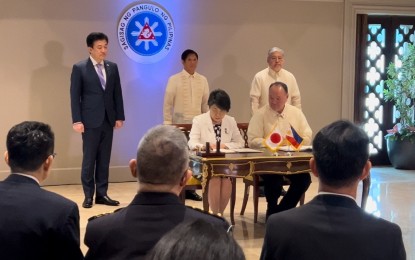From the Philippine News Agency (Jul 10, 2024): More defense pacts seen to follow PH-Japan reciprocal access deal (By Filane Mikee Cervantes)

DEFENSE AGREEMENT. President Ferdinand R. Marcos Jr. (standing, center) witnesses the signing of the Reciprocal Access Agreement (RAA) between the Philippines and Japan at Malacañan Palace on Monday (July 8, 2024). The new defense deal would facilitate mutual visits between Filipino and Japanese armed forces for training and joint exercises. (PNA photo by Darryl John Esguerra)
MANILA – Leaders of the House of Representatives on Wednesday lauded the recent signing of the Reciprocal Access Agreement (RAA) between the Philippines and Japan as it could serve as building blocks of diplomacy and cooperation for future bilateral agreements with other countries.
In a statement, House Committee on National Defense and Security vice-chair Raul Tupas said he expects the Philippines to forge more international agreements with other countries who prefer "cooperation over discord" after the signing of the historic defense pact with Japan.
“It is possible for the Philippines to have a similar reciprocal access agreement with South Korea,” Tupas said, while citing the country’s existing bilateral border agreement with Indonesia.
The Philippines has been expanding engagements with its allies while also beefing up the capabilities of the Armed Forces of the Philippines amid China’s aggression in the West Philippine Sea.
It has similar defense pacts with the United States and Australia, while another defense deal is being pursued with France.
Tupas said enacting the proposed Maritime Zones Act, which seeks to provide a clear delineation maritime boundaries of the Philippines, into law would also result in more bilateral agreements.
“The Permanent Court of Arbitration actually considers, for example, agreements based on traditional fishing rights as a way to resolve overlaps in traditional fishing grounds.” Tupas said.
Senior Deputy Speaker Aurelio Gonzales Jr., meanwhile, said the defense pact between the Philippines and Japan builds on the successful trilateral agreement both countries made with the United States early this year.
“It builds upon the success of the trilateral agreement among the United States, the Philippines and Japan. This trilateral framework has already established a robust foundation for regional security and cooperation, addressing shared challenges and promoting stability in the Asia-Pacific region,” Gonzales said.
He said the RAA would "undoubtedly" enhance defense and security cooperation between Japan and the Philippines as it facilitates the seamless entry and stationing of military forces in each other's territories.
Deputy Speaker David Suarez, also said the enhanced defense cooperation between the two countries is crucial for maintaining regional stability.
“As we face evolving security threats, this agreement provides a framework for coordinated action, ensuring that our forces can operate seamlessly together. This is a significant step towards a more secure and resilient Asia-Pacific region,” he said.
“The RAA is a reflection of our enduring partnership and our shared vision for a peaceful and prosperous future. It is a clear demonstration of our commitment to safeguarding our sovereignty and protecting the well-being of our people,” he added.
Suarez expressed confidence that the partnership would yield greater benefits for both nations.
“Let us build on this success and strive towards a future where our cooperation in defense and security, as well as other areas of mutual interest, continues to flourish,” he said.
Majority Leader Manuel Jose Dalipe said RAA further cements the country’s partnership with Japan, reflecting their “mutual commitment to peace and security.”
“Our engagement with Japan has always been fruitful. Just recently, Speaker Romualdez had the privilege of meeting with his counterpart in the Japanese House of Representatives, where they discussed various avenues for strengthening our bilateral ties,” Dalipe said. “The signing of the RAA is proof to the productive outcomes of such high-level engagements, underscoring the importance of our strategic partnership."
He said by facilitating joint training, logistical support and disaster response, the RAA ensures that both countries are better prepared to address emerging security challenges and humanitarian crises.
On Monday, President Ferdinand R. Marcos Jr. witnessed the signing of the Philippine-Japan RAA at Malacañang Palace.
Defense Secretary Gilberto Teodoro Jr. and Japanese Foreign Minister Kamikawa Yoko signed the agreement after Marcos met with the Japanese officials and delegation.
The treaty will have to be ratified by the respective legislative bodies of the Philippines and Japan before it comes into force.
Internal matter
Meanwhile, in a statement, Department of National Defense (DND) Secretary Gilberto C. Teodoro Jr. said the newly signed RAA is strictly an internal matter between the Philippines and Japan.
Teodoro’s remarks came after China’s Foreign Ministry criticized the agreement, which it said would “provoke confrontation.”
"So, it is actually none of China's business because China would then be interfering in the internal affairs of both Japan and the Philippines," he said. (with report from Priam Nepomuceno/PNA)
https://www.pna.gov.ph/articles/1228679

No comments:
Post a Comment
Note: Only a member of this blog may post a comment.